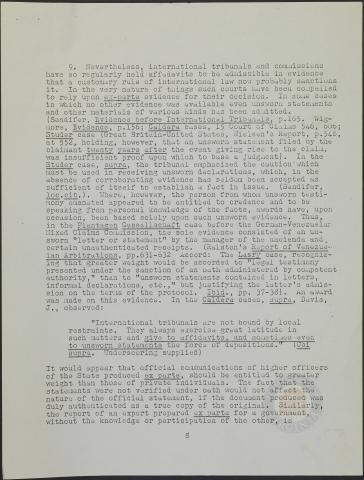
Page 8
| Parent | Perpetuation of testimony by Witnesses in U. S. for Presentation to the International Military Tribunal |
|---|---|
| Date | 18 June 1945 |
| Language | English |
| Collection | Tavenner Papers & IMTFE Official Records |
| Box | Box 3 |
| Folder | General Reports and Memoranda from June 1946 |
| Repository | University of Virginia Law Library |
9. Nevertheless, international tribunals and commissions have so regularly held affidavits to be admissible in evidence that a customary rule of international law now probably sanctions it. In the very nature of things such courts have been compelled to rely upon ex-parte evidence for their decision. In some cases in which no other evidence was available even unsworn statements and other materials of various kinds has been admitted. (Sandifer, Evidence before International Tribunals, p. 165. Wigmore, Evidence, p. 156; Caldera cases, 15 Court of Claims 546, 606;Studer case (Great Britain-United States, Nielsen’s Report, p. 548, at 552, holding, however, that an unsworn statement filed by the claimant twenty years after the event giving rise to the claim, was insufficient proof upon which to base a judgment). In the Studer case, supra, the tribunal emphasized the caution which must be used in receiving unsworn declarations, which, in the absence of corroborating evidence has seldom been accepted as sufficient of itself to establish a fact in issue. (Sandifer, loc.cit.). Where, however, the person from whom unsworn testimony emanated appeared to be entitled to credence and to be speaking from personal knowledge of the facts, awards have, upon occasion, been based solely upon such unsworn evidence. Thus, in the Plantagen Gessellschaft case before the German-Venezuelan Mixed Claims Commission, the sole evidence consisted of an unsworn “letter or statement” by the manager of the hacienda and certain unauthenticated receipts. (Ralston’s Report of Venezuelan Arbitrations, pp.631-632 Accord: The Lasry case, recognizing that greater weight would be accorded to “legal testimony presented under the sanction of an oath administered by competent authority,” than to “unsworn statements contained in letters, informal declarations, etc.,” but justifying the latter’s admission on the terms of the protocol. Ibid., pp.37-38). An award was made on this evidence. In the Caldera cases, supra, Davis, J., observed:
“International tribunals are not bound by local restraints. They always exercise great latitude in such matters and give to affidavits, and sometimes even to unsworn statements the force of depositions.” (Ubi supra. Underscoring supplied)
It would appear that official communications of higher officers of the State produced ex parte, should be entitled to greater weight than those of private individuals. The fact that the statements were not verified under oath would not affect the nature of the official statement, if the document produced was duly authenticated as a true copy of the original. Similarly, the report of an expert prepared ex parte for a government without the knowledge or participation of the other, is
8
